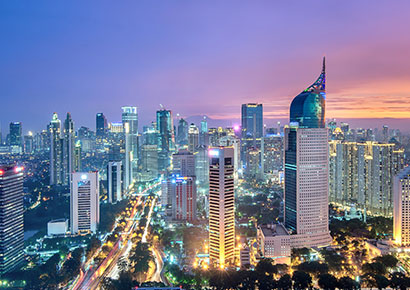The price of bigotry – LGBT discrimination costs Indonesia $12 billion a year

Jakarta, the capital of Indonesia
Discrimination against LGBT people in Indonesia is pervasive and limits their ability to fully contribute to the economy, says a new report.
LGBT Exclusion in Indonesia and Its Economic Effects shows that the cost of discrimination to the Indonesian economy could range from nearly 900 million to 12 billion US dollars.
In the report, researchers from the Williams Institute said that Waria (an Indonesian term for transgender women and effeminate men) people are often unable to get work, stay in school, or open a bank account because the gender listed on their identification cards does not match their gender presentation.
LGBT people and those perceived as LGBT also report high levels of harassment in school, which may reduce educational attainment and reduce economic productivity later in life. In some regions, LGBT people rely heavily on work in the informal employment sector, particularly sex work and jobs in salons.
The authors further noted that studies of LGBT Indonesians show that most have experienced violence, resulting in increased economic burdens. Stress associated with prejudice produces higher rates of depression and suicide, impairing economic productivity, they said.
“To reach their full economic potential, LGBT people need to develop their human capital, or their abilities, skills, and knowledge. This report shows that LGBT Indonesians are often held back from reaching that point, which prevents them from contributing fully to the economy,” commented M.V. Lee Badgett, an economist who has conducted similar studies in other parts of the world.
Badgett compared the Indonesian economy to that of India where similar research has been completed. “If we draw on research from India, we would estimate that the loss resulting from LGBT exclusion in Indonesia would be from 0.1 percent to 1.4 percent of gross domestic product (GDP), or $862 million to $12 billion.”
The report shows that public attitudes in Indonesia are far less accepting of homosexuality than attitudes in India, so this estimate of Indonesia’s estimated financial loss is considered conservative, the authors added.
Human Rights Watch has called on French President François Hollande, who is visiting Indonesia this week, to publicly urge the Indonesian government to address the country’s persistent human rights problems, including a “surge in threats, intimidation, and violence” against LGBT people and activists.
“Hollande should press [Indonesian President] Jokowi to publicly condemn the anti-LGBT violence and harassment, and make a commitment to protect Indonesia’s LGBT population,” said the group.
Homosexuality is legal in Indonesia, except for Aceh province. The national government allowed the province to introduce a by-law through which Muslims found guilty of homosexuality face up to 100 lashes and up to 100 months in prison.
Stigma and discrimination, however, is widespread and has grown in recent years – including intimidation and harassment of LGBT people by religious extremist groups. In November, police arrested 13 men at a gay party, despite them breaking no law.
Local government and education officials have also called for discriminatory anti-LGBT measures, including suggesting bans on LGBT student groups on university campuses and ordering police to halt an HIV outreach event for gay and bisexual men.
Communication and broadcasting bureaucrats also moved to block LGBT content in the media and ordered social media and messaging apps to remove same-sex themed emoticons from their services.
The Indonesian Psychiatrists’ Association has affirmed that it still views homosexuality as a mental disorder, while Defence Minister Ryamizard Ryacudu claimed that LGBT people are a threat to the country.
Do not understand why anyone would want to go there !